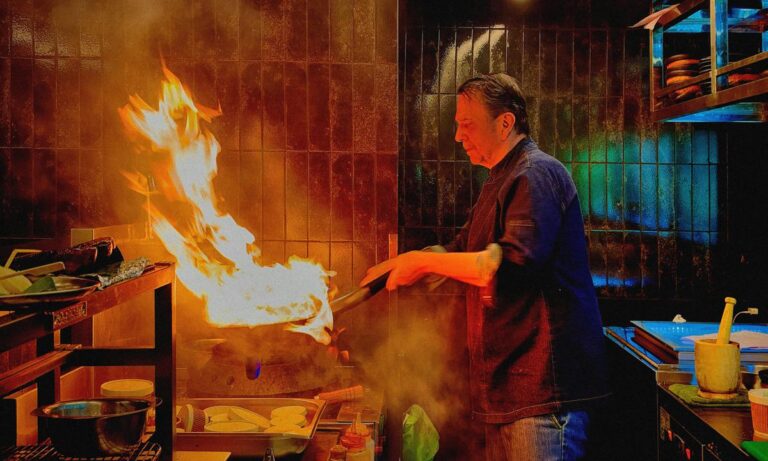In 2002, the first Thai restaurant in history to receive a Michelin star was, believe it or not, run by none other than Australian chef David Thompson. did. Now, his restaurants from Aksorn to Nam are regular features in coveted guides, whether in his homeland, Bangkok or Seoul.
But you don't have to travel abroad to try out Chef David Thompson's ideas. Next time you visit Goa, check out Fireback, the restaurant where he is the culinary director. Run by renowned Indian restaurateur Rohit Kattar, this is a stunning restaurant with views of the magnificent St. Anthony's Church in the Siolim area.
I recently had the opportunity to meet the famous chef over scallop and papaya salad, chicken klapuu, crab fried rice, homemade coffee, and kalhua ice cream. We spoke candidly about his culinary journey, from discovering Thai food to traveling to sunny Goa to discovering his golden rules in the kitchen. Read excerpts from interviews about food.
Conversation with Chef David Thompson
Hello! : What drew you to the culinary world and how did you decide to become a chef?
Chef David Thompson: “You know, life is funny sometimes. My parents were shocked when I told them I wanted to be a chef. My mother's cooking skills were… should I say lacking? Eating at home It was more of a challenge than a reward, but I was hooked and obsessed with the need to cook. I don't know why, but it certainly didn't come from my mother's genes. For a reason, by the time I was 21 I was hooked. There was no rhyme, no reason, no Epiphanian moment. It just happened.”
Ha! : Growing up in Australia, how did you first discover Thai food?
DT: “I still remember the first Thai restaurant I went to in 1979. The first time I had Thai food, I hated Thai food. It was soggy and rubbery fishcakes, and the lemongrass was awful. I just didn't like it. Also, when it comes to food, I have a very good memory. When it comes to other things, it's probably not as clear or distinct.”
Ha! : What were the fears you faced opening your first Thai restaurant?
DT: “I had nothing, because I had the courage of an ignorant person. I was bold and courageous, but it never occurred to me that I was cooking delicious food. I didn't have any qualms when I opened a restaurant in Bangkok, but in the 2000s it made front page news all over Bangkok.''
Ha! : Of all your restaurants, which one is the most special?
DT: “Fireback because we're not trying to be too authentic. We can't be too authentic because we don't have all the materials. We can't get all the materials we need, but we're limited, so we're creative. Nevertheless, meeting customer expectations can be a blessing and a curse at the same time, and comes with its own set of challenges. I love it.”
Ha! : What are the challenges you face as a restaurateur?
DT: “Oh, where do I start? The main reason for customers and staff is that standards are difficult to achieve and put further strain on an already demanding industry. And trying to please your staff while maintaining credibility can be difficult.”
Ha! : What attracted you to Goa? What do you like most about this place?
DT: “This was an opportunity created by Rohit (restaurateur, Qatar) as an idea to take it to other places. It's a very attractive place with like-minded people and good food.”
Ha! : What was your thought process when curating Fireback’s menu?
DT: “My goal was to create something that would satisfy all of the different elements within the restaurant: the discerning palates of the guests, the dedication of the staff, and the culinary vision of the head chef. , it was about maintaining authenticity while embracing the nuances of the Indian taste profile.”
Ha! : You have written three books. But can you share some kitchen rules that you never break or don't let your staff break?
DT: “First and foremost, 'Yes, Chef' — respect and discipline are the cornerstones of a successful kitchen. Second, the last thing you want to do in the kitchen is make a mistake. Because if you follow a recipe and it works, Because you don't consider the dynamics of the taste, cooking process, or method. However, when you make a mistake, you have to analyze and think about it through trial and error. Mistakes can be painful, but they serve as tools for investigation and understanding.”
Ha! : What is your favorite Thai dish?
DT: “I don't know. It really depends. There's a lot of repertoire out there. It's impossible to say. It could be green curry or fish. It could be red curry with shrimp. There's also desserts, tapioca, etc.” I love Thai food because of its rich repertoire and amazing variety of flavors and textures.”


